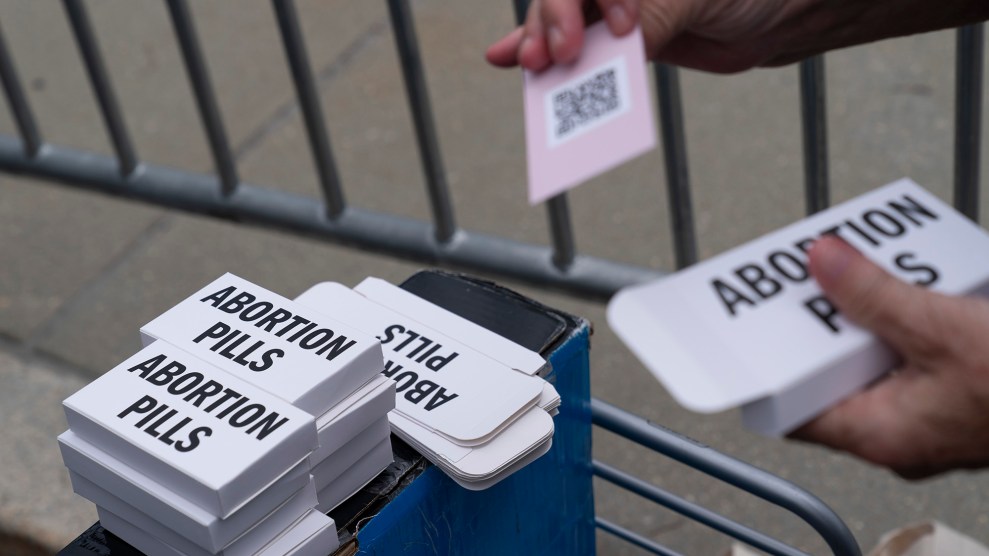
Washington Post/Getty
A dozen Democratic state attorneys general have opened a new front in the legal war over mifepristone, the “gold standard” medication used in the majority of all US abortions. In a federal lawsuit filed Thursday, the AGs—from states including Arizona, Illinois, and Washington—accuse the Food and Drug Administration of imposing unnecessarily “onerous” restrictions on mifepristone, which is used in combination with the anti-ulcer drug misoprostol to end pregnancies in the first 10 weeks.
The drug has a sterling safety record and has been used by an estimated 5.6 million people since it was approved by the FDA more than 22 years ago. Nevertheless, the FDA has long subjected mifepristone to a set of unusual restrictions known as a “Risk Evaluation and Mitigation Strategy” (REMS). The agency only applies these extra rules, such as a requirement that prescribers receive a special certification, to a few dozen drugs—typically high-risk medications like opioids, or injectable anti-psychotic sedatives. The inclusion of mifepristone on this list has long been controversial. “Many people believe that the strict restrictions on mifepristone reflect political concerns more so than concerns around the safety of the drug itself,” Temple University law dean Rachel Rebouché told me in June, the day the Supreme Court overturned Roe v. Wade.
Since then, a dozen states have outlawed abortion almost entirely. Medication abortion has only grown in importance as people who want to end their pregnancies in abortion-hostile states source the pills through telehealth, mail-forwarding services, and overseas pharmacies.
Yet while the FDA has recently loosened some of its rules on mifepristone—for instance, by allowing certified pharmacies to dispense it—the REMS remains in place. “FDA’s decision to continue these burdensome restrictions in January 2023 on a drug that has been on the market for more than two decades with only ‘exceedingly rare’ adverse events has no basis in science,” argues the complaint from the attorneys general. “It only serves to make mifepristone harder for doctors to prescribe, harder for pharmacies to fill, harder for patients to access, and more burdensome for the Plaintiff States and their health care providers to dispense.”
This isn’t the only legal battle over mifepristone. For the few weeks, abortion rights advocates have been waiting and watching as an anti-abortion, Trump-appointed judge in Texas considers issuing a nationwide ban on the drug. That case—brought by the religious-right legal group Alliance Defending Freedom—claims that the FDA “exceeded its regulatory authority” when it approved mifepristone in 2000; that the agency had overlooked potentially harmful side effects; and that a 19th-century anti-obscenity law forbids the mailing of abortion drugs. If the judge agrees and issues a temporary injunction, which he could do any day, mifepristone could be taken off the market everywhere from New York to California.
Meanwhile in West Virginia, the manufacturer of generic mifepristone is fighting yet another legal battle over the medication in federal court. The company, GenBioPro, is asking a federal judge to overturn West Virginia laws that forbid most abortions and ban doctors from using telemedicine to prescribe mifepristone in the few cases where abortion is permitted. Because federal law trumps state law, the company argues, the FDA’s approval of mifepristone should outweigh the state laws that effectively ban the medication. If that argument success, mifepristone could become once again available in all states, no matter if they’ve passed an abortion ban.
“The federal government has known for years that mifepristone is safe and effective,” Washington state attorney general Bob Ferguson, who is co-leading the newest mifepristone lawsuit, said in a statement. “In the wake of the Supreme Court’s radical decision overturning Roe v. Wade, the FDA is now exposing doctors, pharmacists and patients to unnecessary risk.”













